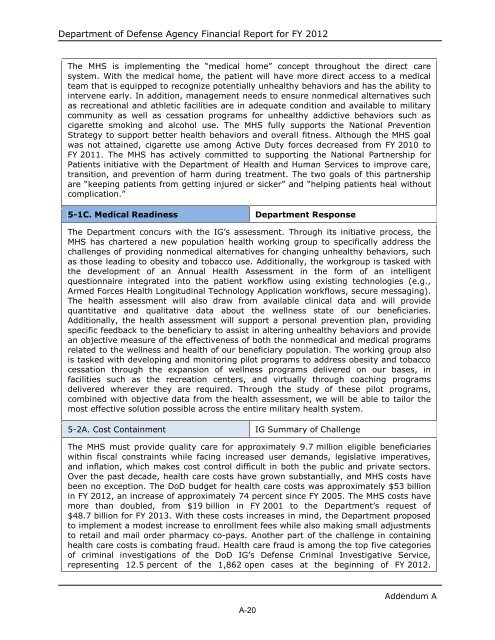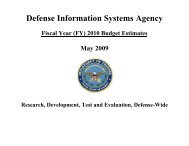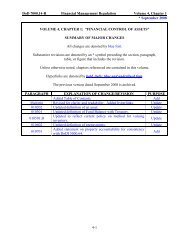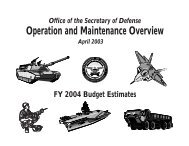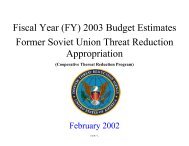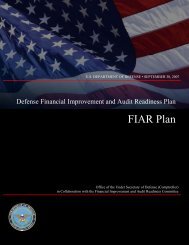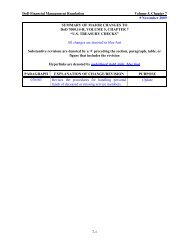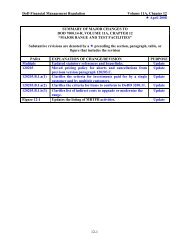department of defense agency financial report fiscal year 2012
department of defense agency financial report fiscal year 2012
department of defense agency financial report fiscal year 2012
You also want an ePaper? Increase the reach of your titles
YUMPU automatically turns print PDFs into web optimized ePapers that Google loves.
Department <strong>of</strong> Defense Agency Financial Report for FY <strong>2012</strong><br />
The MHS is implementing the “medical home” concept throughout the direct care<br />
system. With the medical home, the patient will have more direct access to a medical<br />
team that is equipped to recognize potentially unhealthy behaviors and has the ability to<br />
intervene early. In addition, management needs to ensure nonmedical alternatives such<br />
as recreational and athletic facilities are in adequate condition and available to military<br />
community as well as cessation programs for unhealthy addictive behaviors such as<br />
cigarette smoking and alcohol use. The MHS fully supports the National Prevention<br />
Strategy to support better health behaviors and overall fitness. Although the MHS goal<br />
was not attained, cigarette use among Active Duty forces decreased from FY 2010 to<br />
FY 2011. The MHS has actively committed to supporting the National Partnership for<br />
Patients initiative with the Department <strong>of</strong> Health and Human Services to improve care,<br />
transition, and prevention <strong>of</strong> harm during treatment. The two goals <strong>of</strong> this partnership<br />
are “keeping patients from getting injured or sicker” and “helping patients heal without<br />
complication.”<br />
5-1C. Medical Readiness Department Response<br />
The Department concurs with the IG’s assessment. Through its initiative process, the<br />
MHS has chartered a new population health working group to specifically address the<br />
challenges <strong>of</strong> providing nonmedical alternatives for changing unhealthy behaviors, such<br />
as those leading to obesity and tobacco use. Additionally, the workgroup is tasked with<br />
the development <strong>of</strong> an Annual Health Assessment in the form <strong>of</strong> an intelligent<br />
questionnaire integrated into the patient workflow using existing technologies (e.g.,<br />
Armed Forces Health Longitudinal Technology Application workflows, secure messaging).<br />
The health assessment will also draw from available clinical data and will provide<br />
quantitative and qualitative data about the wellness state <strong>of</strong> our beneficiaries.<br />
Additionally, the health assessment will support a personal prevention plan, providing<br />
specific feedback to the beneficiary to assist in altering unhealthy behaviors and provide<br />
an objective measure <strong>of</strong> the effectiveness <strong>of</strong> both the nonmedical and medical programs<br />
related to the wellness and health <strong>of</strong> our beneficiary population. The working group also<br />
is tasked with developing and monitoring pilot programs to address obesity and tobacco<br />
cessation through the expansion <strong>of</strong> wellness programs delivered on our bases, in<br />
facilities such as the recreation centers, and virtually through coaching programs<br />
delivered wherever they are required. Through the study <strong>of</strong> these pilot programs,<br />
combined with objective data from the health assessment, we will be able to tailor the<br />
most effective solution possible across the entire military health system.<br />
5-2A. Cost Containment IG Summary <strong>of</strong> Challenge<br />
The MHS must provide quality care for approximately 9.7 million eligible beneficiaries<br />
within <strong>fiscal</strong> constraints while facing increased user demands, legislative imperatives,<br />
and inflation, which makes cost control difficult in both the public and private sectors.<br />
Over the past decade, health care costs have grown substantially, and MHS costs have<br />
been no exception. The DoD budget for health care costs was approximately $53 billion<br />
in FY <strong>2012</strong>, an increase <strong>of</strong> approximately 74 percent since FY 2005. The MHS costs have<br />
more than doubled, from $19 billion in FY 2001 to the Department’s request <strong>of</strong><br />
$48.7 billion for FY 2013. With these costs increases in mind, the Department proposed<br />
to implement a modest increase to enrollment fees while also making small adjustments<br />
to retail and mail order pharmacy co-pays. Another part <strong>of</strong> the challenge in containing<br />
health care costs is combating fraud. Health care fraud is among the top five categories<br />
<strong>of</strong> criminal investigations <strong>of</strong> the DoD IG’s Defense Criminal Investigative Service,<br />
representing 12.5 percent <strong>of</strong> the 1,862 open cases at the beginning <strong>of</strong> FY <strong>2012</strong>.<br />
A-20<br />
Addendum A


